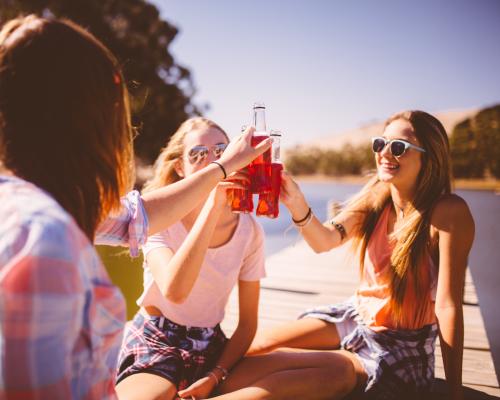
Gen Z have long been hailed as “generation sensible” – dozens of articles have charted how they drink less alcohol, exercise more, eat a more healthy diet and have ditched night clubs for book clubs.
But could that be about to change? Recent data has shown the proportion of gen Z – those born roughly between 1997 and 2012 – who are of legal drinking age and have consumed alcohol in the past six months has increased by 7% between 2024 and 2025.
Alcopops are apparently all the rage among gen Z customers, with booming sales of Smirnoff Ice, Bacardi Breezers and BuzzBallz, while last year’s “brat summer” was said to herald the end of the clean-living era.
The reality, experts say, is more complicated.
“We’re seeing a generational recalibration, not a simple return to hedonism,” said Ivo Vlaev, a professor of behavioural science at Warwick University. “This isn’t a simple return to the past – it’s a complex blend of coping, compensation, identity expression and socioeconomic constraint. The behaviours may look familiar, but the psychology behind them has evolved.”
He said the fact that gen Z came of age during a pandemic, climate crisis and increased concerns over the cost of living was a recipe for “psychological whiplash”.
Key factors at play included a rebound from the restrictions of the Covid era with young people now “reasserting agency through social behaviours”.
Vlaev said research showed that “when autonomy is suppressed, people later overcompensate with behaviours that signal freedom or control”. There was also an element of “self-soothing” as a result of rising levels of anxiety, depression and loneliness, as well as the glamorisation of certain drinks and behaviours on TikTok.
Financial concerns may have also pushed the younger generation towards “present-biased decision-making”.
“When the future feels unstable, people are less likely to invest in long-term health and more likely to seek short-term mood boosts, like alcohol or late nights out,” he said.
Vlaev also said an element of “wellness culture” fatigue had probably set in. “Some gen-Zers are pushing back against the pressure to optimise every aspect of life,” he said.
Richard Halstead, chief operation officer of consumer research at drinks market analysis company IWSR, said: “From a consumer research and data point of view, it does seem there is some pushback on this idea that we’re all perfect, having perfect pictures taken of us on Instagram and we’re all super in control of our lives.
“Every cultural move has a countercultural move associated with it.”
He said gen Z’s attitude towards drinking and socialising was more nuanced than is often portrayed in the media – gen Z were not “puritans” who abstain from alcohol, but nor did they like booze as much as previous generations.
“The idea that gen Z do not drink at all or that they have turned their backs on alcohol is not supported by data,” he said. “The idea that they have a different relationship with alcohol compared to previous generations is supported by data.”
He said that, for instance, gen Z were more likely to drink a wider variety of alcohol, and drink out in bars and restaurants.
“Their pattern of behaviour is actually going out for a reason, as opposed to just meeting for a pint in the pub because the pub’s there and you’ve got nothing better to do,” he said.
Dr Laura Tinner, a research fellow at the Centre for Public Health at the University of Bristol, said people should not underestimate the power of the alcohol companies themselves, keen to capture a younger audience they feared they were losing.
“It’s not necessarily that there has been a swing in the pendulum or a return to previous drinking behaviours, it’s more that alcohol companies are continually trying to target young people with their products,” she said. “They are using the current revival and zeitgeist around 00s and 90s culture to design their products to target young people.”
There was also a suggestion that gen Z were simply older – they are now roughly between the ages of 13 and 28 – so those at the older end of the group were more likely to have access to well paid jobs and disposable income.
“I think we’re seeing some tailwinds develop,” said Halstead. “They’re getting older so some are probably in better paying, stable jobs and they’ve got more opportunity perhaps to do things that people with a bit more money like to do, which is go out and buy a drink and not worry too much about how much it costs you.”
What many researchers were interested in was whether the characteristics that make gen Z different from their predecessors will stay with them as they age, with evidence suggesting generations become more and more similar as they get older.
“We’ve always had a question about whether or not the decline [in drinking alcohol] will persist into adulthood,” said Dr Laura Fenton, a research associate at the University of Sheffield who specialises in youth drinking cultures.
“What makes gen Z slightly distinct as a generation is their attitude towards risk. They’ve engaged in fewer [risky pursuits] proportionally compared to people their age 20 years ago – and that extends to sex, it extends to driving, it extends to smoking and drug use,” she said.
“I think the question really is, is their approach to risk going to stay intact?”





